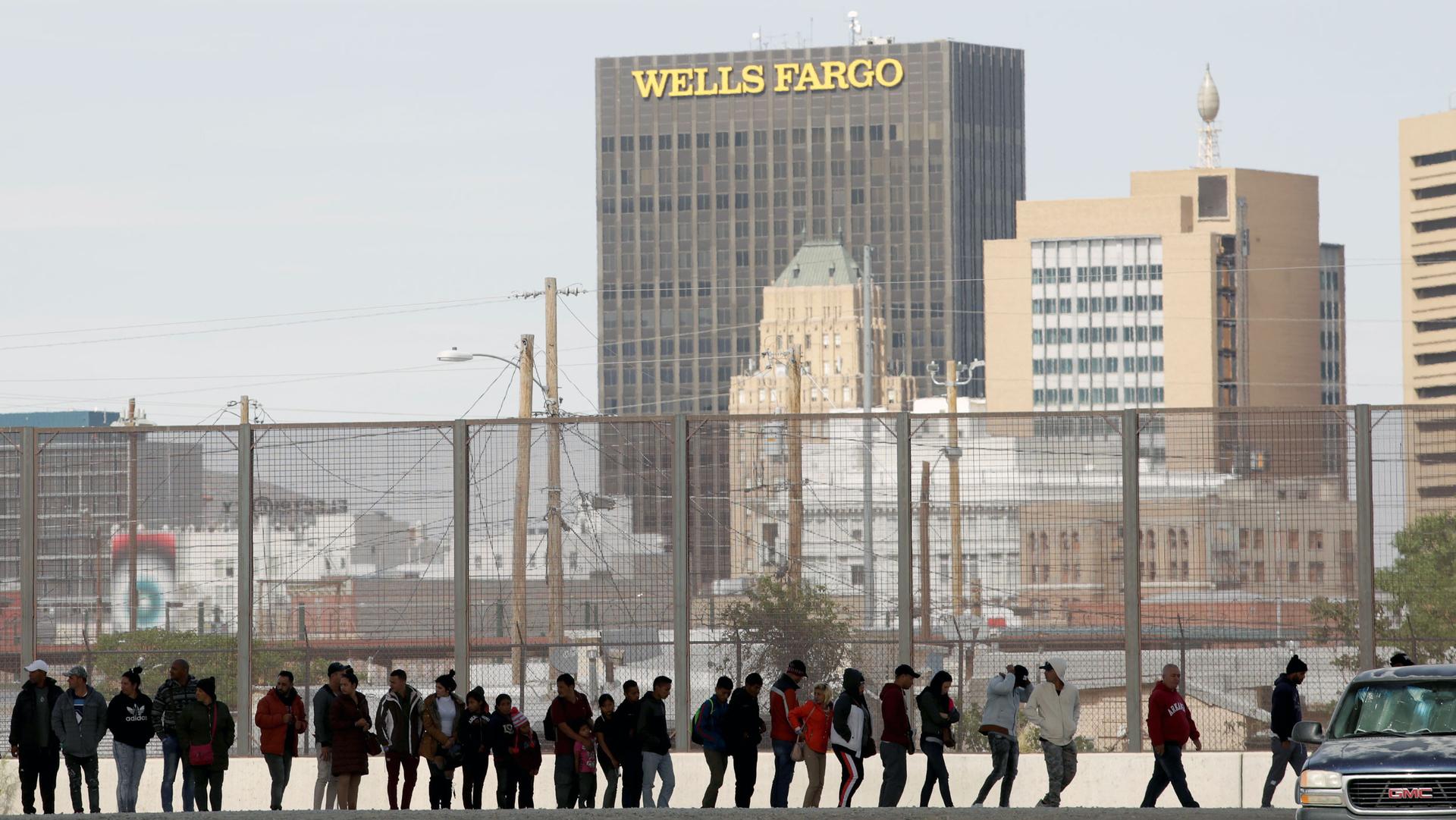As Trump knocks Mexico on immigration, López Obrador keeps quiet
Migrants from Central America are escorted by US Customs and Border Protection officials after crossing into the United States illegally and turning themselves in to request asylum in El Paso, Texas, on April 1, 2019. The photo is taken from Ciudad Juarez.
President Donald Trump’s favorite punching bag these days is Mexico.
Trump also said he is “100 percent” ready to close the US southern border if Mexico doesn’t stop Central American migrants from heading north.
Mexico’s response? A shrug.
Mexican President Andrés Manuel López Obrador is engaging in a delicate balancing act by refusing to confront Trump’s attacks head-on while also consenting to some of the more hardline aspects of US immigration policy.
López Obrador’s demure response to Trump might surprise some who followed Mexico’s presidential election last year. On the campaign trail, López Obrador insisted that Trump would have to respect Mexico, and that if Trump wrote something disparaging about Mexico on Twitter, “there would be a response.”
But as president, López Obrador, or AMLO, as he’s known, has refused to engage.
Related: Trump administration “seems disinclined to cooperate,” says former US ambassador to Mexico
“We are committed to keeping a good relationship with the US. One of friendship, cooperation and mutual healing,” he said at his morning news conference on Tuesday. “We are not going to fall to any provocation.”
This approach makes sense, said Esteban Illades, a journalist and political analyst in Mexico City.
“In a nutshell, AMLO doesn’t really want to start a fight with Trump knowing that it won’t lead anywhere,” Illades said. “If he answers back, Trump will just escalate the rhetoric and AMLO won’t get very much out of it and, on the contrary, it will just make things worse.”
Related: US rolls out ‘Remain in Mexico’ plan for asylum-seekers
There’s a lot on the line for Mexico — like the updated NAFTA agreement, which still hasn’t been ratified. Illades said López Obrador can’t risk losing that. So instead, López Obrador is pursuing diplomacy behind the scenes, including meeting Jared Kushner for dinner last month in Mexico City at the house of a television tycoon.
“He is using the old strategy of trying to find a back channel with the Trump administration,” Illades said.
Read also: Why a wall won’t stop drugs from crossing US-Mexico border
One of the discussion points at that dinner was López Obrador’s new strategy: A desired regional policy to address the root causes of Central American migration, including poverty, violence and organized crime.
López Obrador is asking the US to guarantee $10 billion in development investments for Mexico and Central America. Such a commitment appeared to be moving forward until Trump doubled down on his promise this week to cut off aid to Honduras, El Salvador and Guatemala.
Meanwhile, López Obrador has begun giving out thousands of visas to Central Americans so they can work legally in Mexico. Last year, a record number of Central Americans applied for asylum in Mexico.
The problem is that most Central Americans still want to reach the US, said Gretchen Kuhner, director of Institute for Women in Migration, an immigration rights group in Mexico City.
“So, while more people are staying in Mexico to request asylum than ever before, many people are also arriving at the US border,” she said.
Related: Why are so many migrant families arriving at the southern US border?
And despite López Obrador’s long-term goals for regional stability, the Mexican president has helped carry out some of Trump’s most hardline immigration policies.
Most significantly, and to the surprise of just about everyone, López Obrador tacitly accepted the Trump administration’s new policy requiring asylum seekers to remain in Mexico while their cases play out in US courts. Mexican immigration officials are also refusing to let Central American migrants without visas onto international bridges to apply for asylum in the US and intercepting unaccompanied minors seeking to cross. Since 2015, Mexico has deported more Central Americans than the US.
Mexico wants to have it both ways, said Carlos Bravo Regidor is a professor at CIDE, a university in Mexico City. He said López Obrador’s administration wants a humanitarian policy toward Central Americans — but not at the expense of its relationship with the US.
“I think it’s clear that this government at least in principle wants a policy that is more sensible to their situation, to the emergency that they are facing, and more respectful of their rights,” he said. “On the other hand, this administration wants to play ball with the US.”
Our coverage reaches millions each week, but only a small fraction of listeners contribute to sustain our program. We still need 224 more people to donate $100 or $10/monthly to unlock our $67,000 match. Will you help us get there today?
